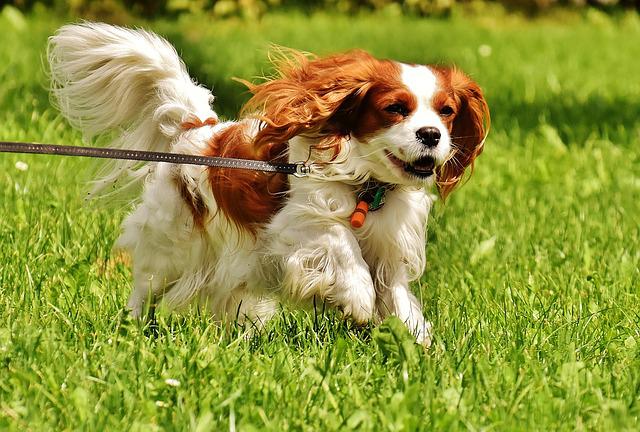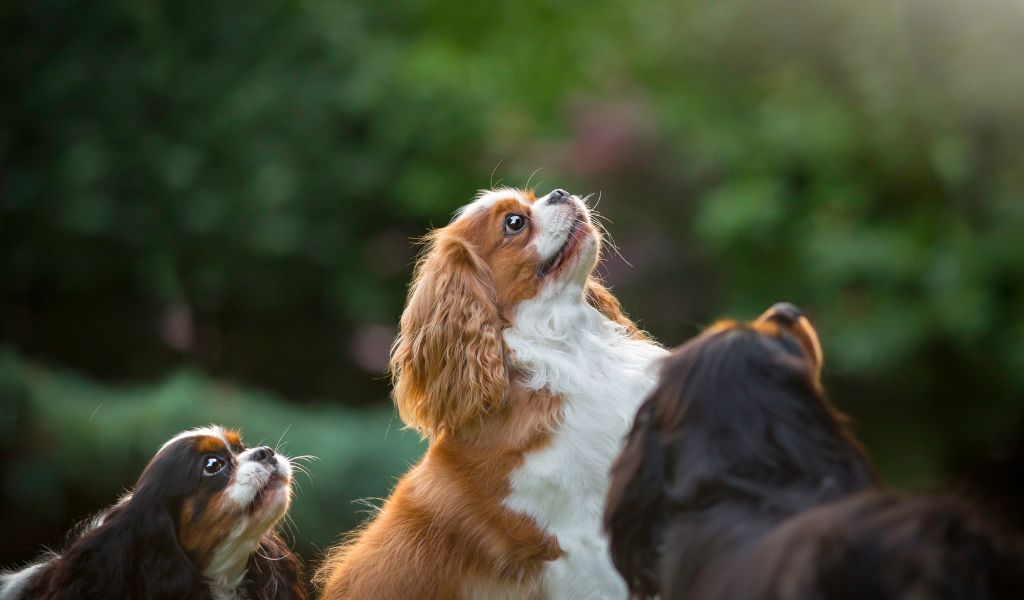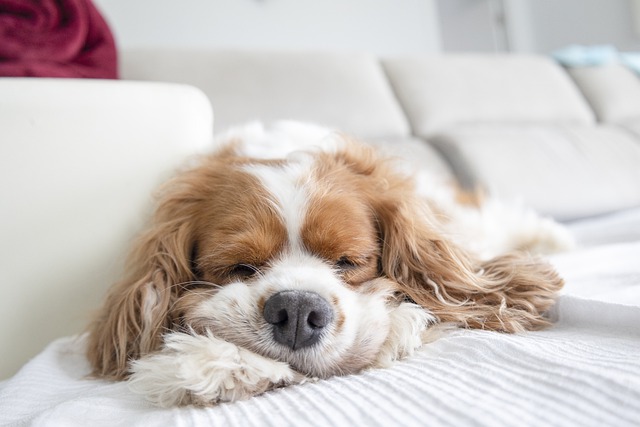Cavalier King Charles spaniels are a popular breed of dog, known for their friendly and loving nature.
However, Cavalier King Charles spaniels can also be prone to excessive barking.
If you’re finding that your Cavalier King Charles spaniel is barking too much, there are a few things you can do to help stop the behavior.
It’s important to figure out why your Cavalier is barking. Is he barking because he’s bored? anxious? wants attention? or has been disturbed? Once you know the reason behind the barking, you can start to work on addressing the behaviour.
Why do Cavaliers bark?
Barking is a perfectly normal activity for most breeds of dogs and Cavalier King Charles spaniels are no exception.
While some Cavalier King Charles spaniels may only bark when there’s something worth barking at, others may bark excessively and for no apparent reason.
If your Cavalier King Charles falls into the latter category, there are a few steps that you can take to reduce his excessive woofing.

Increase his exercise levels
First, make sure that your Cavalier is getting enough exercise.
A tired dog is a good dog and if your spaniel is getting enough physical activity, he’ll be less likely to bark out of boredom.
Take your Cavalier King Charles for walks or runs twice a day and make sure to give him plenty of opportunities to play.
A Cavalier King Charles spaniel who is well-exercised is less likely to bark excessively.

Provide mental stimulation
In addition to physical exercise, your Cavalier King Charles spaniel will also benefit from mental stimulation.
Dogs are intelligent creatures and they need to be given opportunities to use their brains.
Try setting up a treasure hunt in your home or teaching your Cavalier some new tricks.
There are also a number of dog toys on the market that are designed to provide mental stimulation, such as Kongs stuffed with treats or puzzle toys.
Mental stimulation can help to tire out your Cavalier and reduce excessive barking.
Address any underlying health issues
If your Cavalier King Charles spaniel is barking excessively, it’s important to rule out any underlying health issues that could be causing the behaviour.
For example, pain or discomfort can sometimes lead to excessive barking. If you think that your dog may be in pain, make an appointment with your veterinarian.

Barking can be a result of anxiety
If anxiety is the cause of your spaniel’s barking, you’ll need to work on building his confidence.
Start by slowly exposing him to the things that make him anxious, in a controlled environment.
For example, if your Cavalier is afraid of other dogs, start by having him meet just one other dog at a time, in a quiet place where there aren’t too many distractions.
Once he feels comfortable around one dog, you can gradually start introducing him to more dogs, in different environments.
With time and patience, your Cavalier King Charles will start to feel more confident and his anxiety will lessen, which will help reduce his barking.
Barking can sometimes be attention seeking behaviour
Dogs will often bark to get attention from their owners and this can be common among dogs that don’t get enough exercise or mental stimulation.
If your Cavalier is barking for attention, the best thing you can do is ignore the behaviour.
When your dog starts barking, turn your back and walk away from him.
Once he’s quiet, you can give him the attention he wants.
This will teach him that he won’t get what he wants by barking, but by being quiet.






Start a training program
Once you’ve addressed any underlying health issues and made sure that your Cavalier King Charles spaniel is getting enough exercise, you can start working on a training program to address the excessive barking.
There are a number of different ways to do this, but one of the most effective is to use positive reinforcement.
Whenever your Cavalier does not bark excessively, make sure to give him lots of praise and rewards.
This could include treats, petting or even just verbal praise.
Eventually, your spaniel will learn that he gets rewarded for not barking excessively and the behaviour should start to decrease.

Stay calm when dealing with barking
Often many Cavalier and other dog owners will raise their voices or adopt other confrontational type responses to address barking.
If you raise your voice when your dog barks then it’s likely that he’ll simply think that you are joining in and your efforts will be in vain.
Barking is often an alert, used by a dog to warn others of danger, if he barks and then you shout, you are simply joining in with the alert and are encouraging him to carry on.
Similarly, if you adopt a physical approach and, in the terms of some ‘dog trainers’ attempt to assert your ‘dominance’ when your dog barks by hitting him, for example, then you’ll fail and will only frighten and confuse your dog.
The best approach is to try and remain calm and to not react to your spaniel’s barking – he won’t learn anything if you bounce off the walls when he woofs.
So, stay quiet, and, when he stops barking, reward him for being quiet.
If you draw attention to his barking by shouting at him, hitting him or similar then you are in for a bumpy ride which will achieve nothing.

Some barking is normal
All dogs will act as guardians of their families and homes and, if they hear something that they don’t recognise, then it is highly likely that they will bark.
This could be a knock at the door or the doorbell ringing, it could be a window rattling in the wind or something falling over outside.
Your Cavalier will probably alert you to noises that he hears.
How you respond to these ‘alerts’ is up to you, but I would suggest that you adopt a quiet and controlled approach when reacting so that you don’t overly encourage your dog.
In the same manner, a dog that alerts you to potential intruders is valuable and, he is only doing his job – so respond accordingly to his barks.
Final Words
Remember that some barking is perfectly normal for your Cavalier King Charles spaniel but, if it become excessive then it is important to address the issue.
There are a number of different ways to go about this, but the most important thing is to remain calm and consistent in your approach.
If you do this, then you should see a reduction in the excessive barking from your Cavalier King Charles spaniel in no time.




